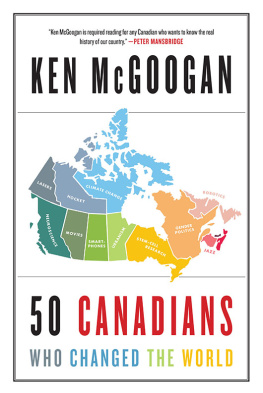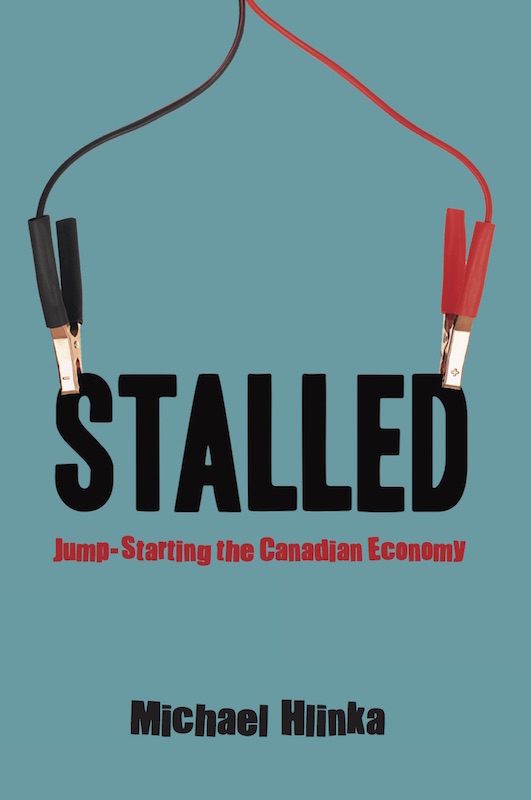Copyright
Copyright Michael Hlinka, 2015
All rights reserved. No part of this publication may be reproduced, stored in a retrieval system, or transmitted in any form or by any means, electronic, mechanical, photocopying, recording, or otherwise (except for brief passages for purpose of review) without the prior permission of Dundurn Press. Permission to photocopy should be requested from Access Copyright.
Editor: Dominic Farrell
Cover design: Courtney Horner
Interior design: Martin Gould
Cover image: Don Nichols/istockphoto.com
Epub Design: Carmen Giraudy
Library and Archives Canada Cataloguing in Publication
Hlinka, Michael, author
Stalled : jump-starting the Canadian economy / Michael Hlinka.
Includes index.
Issued in print and electronic formats.
ISBN 978-1-4597-2360-3 (pbk.).--ISBN 978-1-4597-2361-0 (pdf).-
ISBN 978-1-4597-2362-7 (epub)
1. Canada--Economic conditions--20th century. 2. Canada-
Economic conditions--21st century. 3. Stagnation (Economics).
I. Title.
HC113.H55 2015 338.971 C2014-908127-8
C2014-908128-6
We acknowledge the support of the Canada Council for the Arts and the Ontario Arts Council for our publishing program. We also acknowledge the financial support of the Government of Canada through the Canada Book Fund and Livres Canada Books, and the Government of Ontario through the Ontario Book Publishing Tax Credit and the Ontario Media Development Corporation.
Care has been taken to trace the ownership of copyright material used in this book. The author and the publisher welcome any information enabling them to rectify any references or credits in subsequent editions.
J. Kirk Howard, President
The publisher is not responsible for websites or their content unless they are owned by the publisher.
Visit us at: Dundurn.com
@dundurnpress
Facebook.com/dundurnpress
Pinterest.com/dundurnpress
Introduction
Canada has been very good to the Hlinka family.
My grandfather was born in Litminova, Czechoslovakia, a tiny village in the Tatra Mountains, in the year 1900. Litminova was then part of the Austrio-Hungarian Empire. My grandfather came to Canada in 1926 when his first-born son, my father, was three years old. He made a difficult decision and left his family behind to come to the New World. His plan was to take all the risk, establish something, then reunite his family. It took nine years for him to make his dream come true. He brought his wife and two children over and he never looked back.
My father was born in 1923, and came to Canada in 1935 when he was twelve years old. It was in the midst of the Great Depression. Several years ago, I asked him what his first impression of his new home was and he replied: I couldnt believe that there was so much wealth in the world. That tells you everything about where he came from. My grandfather came to Canada when he was twenty-six years old. He grew to a height of just over five feet tall. My father arrived in Canada at the age of twelve. My father stands about five feet, six inches tall. I was born and raised here and Im almost six feet, average height for a native-born Canadian. If that isnt a metaphor for what Canada has provided people from all over the world, I dont know what is. This was the Land of Opportunity, and everyone, recent immigrants and the native-born alike, have shared in the countrys success and grown, both figuratively and literally, in this great land.
However, I believe that something has happened. Something regrettable. The Land of Opportunity has transformed itself into the Land of Outcome. Canada has lost the pioneering spirit and appetite for risk that made it so worthwhile, trading the certainty of mediocrity for the possibility of excellence. Were seeing this in many different facets of life but most obviously in the Canadian economy.
There were fifty extraordinary years, from approximately the end of the Second World War to the beginning of the current millennium, where the average citizen the average enjoyed a quadrupling of his or her standard of living. And Id argue that the quality of life grew even more exponentially. This was something the world had never seen before, a truly remarkable transformation. Yet, in the past fifteen years or so, the economy has more or less stalled something that I never thought would happen when I was growing up.
This is a big problem for Canada. But its one that has a solution. In this book Ill be looking at Canadas stalled economy and suggesting what can be done to fix it.
I will attempt to explain three things:
- What were the factors that drove the Golden Age of growth from 1950 to 2000?
- What caused a once vibrant economy to stagnate over the past decade and a half?
- What will it take to get the Canadian economy growing and moving again so that Canada can provide future generations the same kind of opportunities that were afforded me?
I hope that readers note these words carefully. This is not a doomsday tract, warning that the end is nigh if we dont change our ways. Rather, what I think far more likely is that if we proceed in the current direction (and theres no indication that were not going to, at least that I can see), most of you reading this book will lead good lives. Older Canadians and here I include myself will guarantee that our comforts are provided for, at the expense of younger generations if need be. And to many of my fellow citizens, this might be acceptable.
To me, its not.
When I undertook this project, there were a couple of questions that I was asked frequently:
- Why are you writing this book?
- To whom is it directed?
The why is easy. Ive had a lifelong love affair with reading, and several different books have had a profound impact on my life, fundamentally shaping who I am and the roads Ive travelled. It may be optimistic to think that this book could have a similar impact on others and I understand that in this desire I may flatter myself but if I dont, who will?
Theres another reason why Im writing this book. And its the Number One Reason, hands down. I want Stalled to be a bestseller. Or perhaps more accurately: I want it to be a runaway bestseller.
To be considered a bestseller in Canada, five thousand copies must be sold within twelve months of publication. Keep in mind that more than two million people watch Jerry Springer daily. That provides some context about what being a Canadian bestseller signifies. Ive been told by industry people I trust explicitly that twenty-five thousand is huge .
Ive got my own number in mind and well get to it in a moment.
As for the question of who this book is aimed at, let me answer that in a somewhat roundabout way.
Throughout this book, Im going to demand more of my readers than most authors. On numerous occasions, Ill be asking you to join me in working through some basic math and exercises in probabilities to illustrate different points.
Heres our first go at it.
Canadas population is approximately thirty-five million. Im not sure that Stalled is suitable for young Canadians (fourteen and younger). That knocks off about 5.5 million people. Lets round things off and say the market is thirty million. My hunch is that if everyone were forced to read Stalled through to the end, at least 33 percent of the population would bemoan the fact that capital punishment was abolished years ago. Perhaps 17 percent would go so far as to write their MP and see if Canada couldnt put public stoning to a vote of conscience in the House of Commons. ( Stalled will ruffle some feathers.) But Ive got an even stronger belief that there is a significant number (my hunch is that its about 33 percent of adult Canadians) who will read Stalled and think: Finally! This is the book Ive been waiting years for. Finally, someone has made sense out of what Ive been seeing around me, someone has the guts to say what has to be said and state the obvious!










